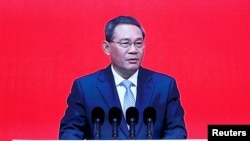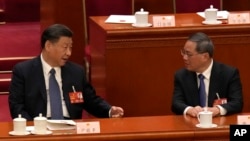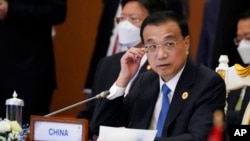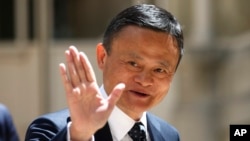Speculation has been spreading about the future, role, and place in China’s power structure of Premier Li Qiang since the unexplained cancellation of a routine press conference he was expected to hold last month. It was arguably the biggest news about Li, a figure largely unknown to the outside world, since he took office a year ago.
Analysts tell VOA that to better know Li, it is important to understand his place in China’s leadership structure – highly centralized under Communist Party General Secretary Xi Jinping’s tight rule – and the two men’s past together, which stretches back two decades.
Path to premiership
Li was born in 1959 in a rural area of China’s coastal province Zhejiang. His family is rooted in the farming communities of Zhejiang, and Li started out working as an industrial laborer at the age of 17 after he graduated from high school.
His background differs sharply from that of his boss, Xi Jinping, whose father was one of China’s first generation of Communist Party leaders. His background is also different from that of his immediate predecessor, Li Keqiang, who studied at the prestigious Beijing University and whose father was a local party official.
Li Qiang’s climb within the ranks of the Chinese Communist Party began after studying at an agricultural college in his home province. After graduating in 1982, Li did not work in factories or in the rural communities again.
From 2000 to 2002, Li presided over the Zhejiang provincial bureau of commerce. In 2002, at age 43, he rose to become the youngest Communist Party secretary of Wenzhou, known to be a capital of entrepreneurs, in his native Zhejiang province.
That same year, Xi Jinping moved from Fujian, another coastal province, to lead Zhejiang as its party secretary, directly overseeing Wenzhou and other municipalities.
It was during Xi’s tenure in Zhejiang, from 2002 until he left for Shanghai in 2007, that the two men had opportunities to know each other. From 2004 to 2005, Li served as the chief of staff to Zhejiang’s provincial Communist Party committee, essentially Xi’s chief of staff. His portfolio soon expanded to include membership in the provincial Communist Party standing committee, deputy provincial party secretary, head of the provincial political and legal affairs committee, and governor of Zhejiang.
Li was promoted to party secretary in neighboring Jiangsu province in 2016 and a year later to party secretary of Shanghai. He was placed in the premiership in March 2023.
“It is fair to say that all of his later promotions happened thanks to Xi,” Xia Ming, a China-born political science professor at the City University of New York, said in a phone interview with VOA.
Wenzhou model
“It’s worth noting that Li is closely tied to what is known as the ‘Wenzhou model,’ which resembles what is known in the West as liberal economics,” Xia added.
What enabled the private entrepreneur-led “Wenzhou model” to succeed, Xia said, was local Communist Party officials’ non-interference at the time, which stands in contrast with the party’s heavy-handedness today.
“Now that Li has joined Xi’s cabinet, whatever model he might have been tied to will have to succumb to the Xi model,” Hu Ping told VOA. Hu Ping is a native of China’s south-central Sichuan province and received his degrees from Beijing University in the 1980s, before entering into exile in the United States. Hu Ping is editor emeritus of China Spring magazine.
Steve Tsang, author of The Political Thought of Xi Jinping, explained to VOA in a phone interview from London how he sees the Xi model: “What Xi Jinping is trying to do is to create one country, one people, one ideology, one party, one leader,” Tsang said.
Unlike Li Keqiang, who landed the job due to support from party elders, Tsang added, Li Qiang was hand-picked by Xi and is expected to do Xi’s bidding.
While Li Qiang’s appointment to succeed Li Keqiang is seen as an attempt to solidify the above model, there were signs that Li Qiang’s ties with the Chinese business community from his years working in Zhejiang, Jiangsu and Shanghai might be tapped to help Xi solve some of the country’s economic challenges.
Potential mediator
The Economist reported in March of last year that Li Qiang had a hand in persuading one of China’s most famous businessmen, Jack Ma, to return to China. Ma, like Li, a native of Zhejiang, had reportedly fallen out with Xi amid crackdowns on private enterprises and Ma’s increasing popularity, both at home and abroad. Ma was said gone into self-imposed exile in Japan.
Li was “trying to reassure wealthy private entrepreneurs that, though they should know their place, they are still valued by the party,” according to the article.
Despite assurances to Ma and private entrepreneurs, China’s economy continues to face big challenges, including falling foreign direct investment and outflow of capital.
Li Qiang’s predecessor, Li Keqiang, was known for his straight talk on China’s economy and calling for a more domestic welfare-centered approach, in contrast to the state power-centric and expansionist model put forth by Xi.
In May 2020, Li Keqiang told reporters at the National People’s Congress press conference that more than 40 percent of China’s population of 1.4 billion live on $143 a month, remarks seen as a rebuke of the official line that poverty has been eliminated all throughout the country under Xi’s leadership.
Li Keqiang even developed an index for measuring China’s economic growth that was deemed more reliable than local government figures because it looked at railway cargo volume, electric consumption and loans disbursed by banks.
Li Qiang, who stepped into Li Keqiang’s role a year ago, is widely seen as a Xi protégé whose key job is doing the bidding of China’s leader. Whether that might include other mediation efforts on behalf of Xi in China’s political and economic power struggles remains to be seen.
“To be a middleman, or power broker, you need to have a certain amount of sway on both sides,” said City University of New York’s Xia Ming. Putting his loyalist credentials aside, Xia said Li is also under pressure to show his ability to take care of the Chinese Communist Party’s pocketbook.
Mao Zedong’s old saying that political power grows out of the barrel of a gun has since been amended, Xia adds. To stay in power, the money bag is a key factor as well.











